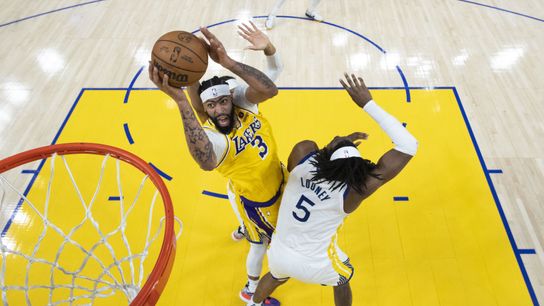With one inadvertent elbow to his face, Los Angeles Lakers forward Anthony Davis showed immediate pain that left him unable to play for the remainder of the game and to stay on the court.
Can Davis recover quickly? The answer to that question could determine whether the Lakers can recover from a 121-126 loss to the Golden State Warriors in Game 5 of their second-round series on Wednesday in San Francisco. The Lakers don’t have a lot of time to receive clarity on that answer before hosting Game 6 against Golden State on Friday in LA in a potential close-out game.
Lakers coach Darvin Ham told reporters that Davis “seems to be doing better already.” TNT also reported that Davis “appears to have avoided a concussion.” But no one fully knows the severity of Davis’ potential injury just yet after Warriors forward Kevon Looney inadvertently elbowed Davis in his face while chasing a rebound late in the fourth quarter.
Davis left the game with 7:34 remaining before sitting on the bench. After struggling to see while sitting down, Davis exited the court about a minute later. And he remained so limited with his movement that TNT reported the Lakers’ medical staff wheelchaired him toward a room near the visitor’s locker room.
What do these developments exactly mean? Hard to say. Some players show immediate pain following a physical play, but show no concussion-like symptoms the following day. Some players display no symptoms whatsoever following the point-of-contact before receiving a concussion diagnosis a day later. Some players display the same level of symptoms both after the play and the following day.
The NBA passed concussion protocols in 2011 that require both extensive medical evaluations and rehabilitation steps before returning to play. Even if a player is not diagnosed with a concussion immediately, the team’s medical staff has to evaluate the player for another concussion about 24 hours after the initial evaluation. That means the Lakers won’t fully know about Davis’ condition until late Thursday night.
If Davis is diagnosed with a concussion, he will have to pass a series of tests symptom-free before returning to the court. Those steps include the following exercises: stationary bike, light jogging, running, jumping and agility drills and team drills with limited contact. Should a player complete those tests while remaining symptom-free, he’ll then be cleared to play without restrictions. After former Lakers guard Kobe Bryant suffered a concussion in the 2012 NBA All-Star game, it only took him three days to clear concussion protocols and he didn’t miss any regular-season games. The NBA doesn’t offer an official timeline on when players can clear concussion protocols, but it typically has taken players at least a week to 10 days before returning.
In other words, Davis would definitely miss Game 6 and a possible Game 7 on Sunday should he actually have a concussion. He would also likely miss the beginning of the Western Conference Finals against either the Denver Nuggets or Phoenix Suns, if the Lakers even advance that far. It goes without saying that Davis’ availability could seriously determine whether the Lakers can close out in Game 6, let alone win a full seven-game series against Golden State.
Before his injury, Davis had posted 23 points on 10-for-18 shooting and nine rebounds. Though his offensive production varied between dominant or passive depending on his aggressiveness level and the opponent’s defense, Davis stayed consistently stellar on defense. In the playoffs, Davis led the NBA in blocks (3.4) and defensive rebounds (11.2) while the Lakers led the league in defensive rating (106.6). Against the Warriors, Davis served as both an effective rim protector and capable perimeter defender.
Lakers fans may have dreaded all season that injuries would ultimately undo any on-court success Davis experienced. Davis missed a combined 26 games this season due to various ailments, including 23 to a right foot stress injury. The Lakers sat him in two back-to-backs in March only for maintenance purposes, and he has played ever since. Nonetheless, the Lakers have listed Davis on the injury report, suggesting that he is at least playing through some pain without seriously compromising himself for potential long-term structural damage.
But Davis’ latest setback should not be viewed through the same lens as his extensive injury history. Players can suffer concussions no matter how durable or frail they are. This is also not an ailment that a player can simply toughen up and play through in a pivotal playoff game. The NBA has set up these concussion protocols because of the obviously long-term ramifications a player can experience if he does not rehab properly. And though team physicians will evaluate Davis throughout this process, they also have to consult with the league office and independent neurologists. Regardless of the pressure the Lakers feel internally for Davis to suit up, they won’t be able to downplay any potential concussion he has.
All of which leaves the Lakers in an ultimate predicament. Technically, they remain in control with a 3-2 series lead against Golden State. Technically, LeBron James and proven role players could still prevail against a Warriors team featuring Stephen Curry, Klay Thompson and Draymond Green. But the Lakers’ best chance for success hinges on a variable they have no control over.
